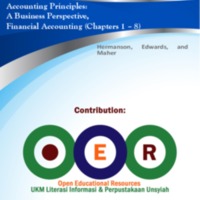Accounting Principles: A Business Perspective,
Financial Accounting (Chapters 1 – 8)
Dublin Core
Description
Preface from the eight edition:
Philosophy and purpose
Imagine that you have graduated from college without taking an accounting course. You are
employed by a company as a sales person, and you eventually become the sales manager of a territory.
While attending a sales managers' meeting, financial results are reviewed by the Vice President of Sales
and terms such as gross margin percentage, cash flows from operating activities, and LIFO inventory
methods are being discussed. The Vice President eventually asks you to discuss these topics as they
relate to your territory. You try to do so, but it is obvious to everyone in the meeting that you do not know what you are talking about.
Philosophy and purpose
Imagine that you have graduated from college without taking an accounting course. You are
employed by a company as a sales person, and you eventually become the sales manager of a territory.
While attending a sales managers' meeting, financial results are reviewed by the Vice President of Sales
and terms such as gross margin percentage, cash flows from operating activities, and LIFO inventory
methods are being discussed. The Vice President eventually asks you to discuss these topics as they
relate to your territory. You try to do so, but it is obvious to everyone in the meeting that you do not know what you are talking about.
Source
https://www.saylor.org/site/wp-content/uploads/2011/11/BUS103-TEXTBOOK.pdf
Publisher
Contributor
Rahmah Agustira
Rights
Creative Commons
Type
Files
Collection
Citation
Hermanson, Edwards, and Maher, “Accounting Principles: A Business Perspective,
Financial Accounting (Chapters 1 – 8),” Open Educational Resources (OER) , accessed March 4, 2026, https://oer.uinsyahada.ac.id/items/show/173.


